KIA Niro: Normal Maintenance Schedule - For Gasoline Engine
Kia Niro - First generation - (DE) (2017-2022) - Service and Repair Manual / Maintenance / Normal Maintenance Schedule - For Gasoline Engine
The following maintenance services must be performed to ensure good emission
control and
performance. Keep receipts for all vehicle emission services to protect your
warranty.Where both
mileage and time are shown, the frequency of service is determined by whichever
occurs first.
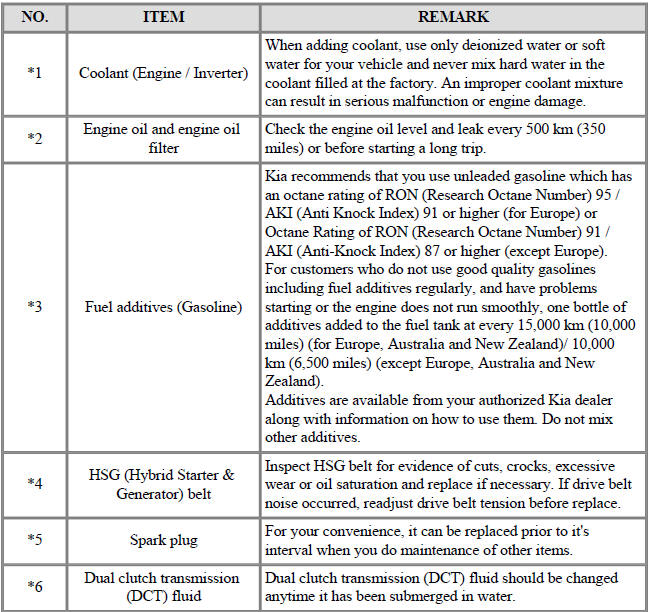
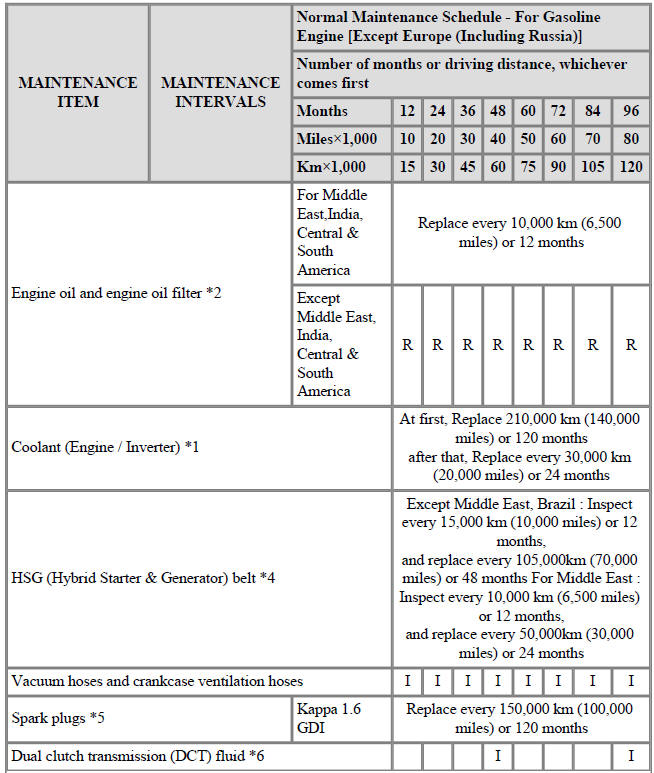
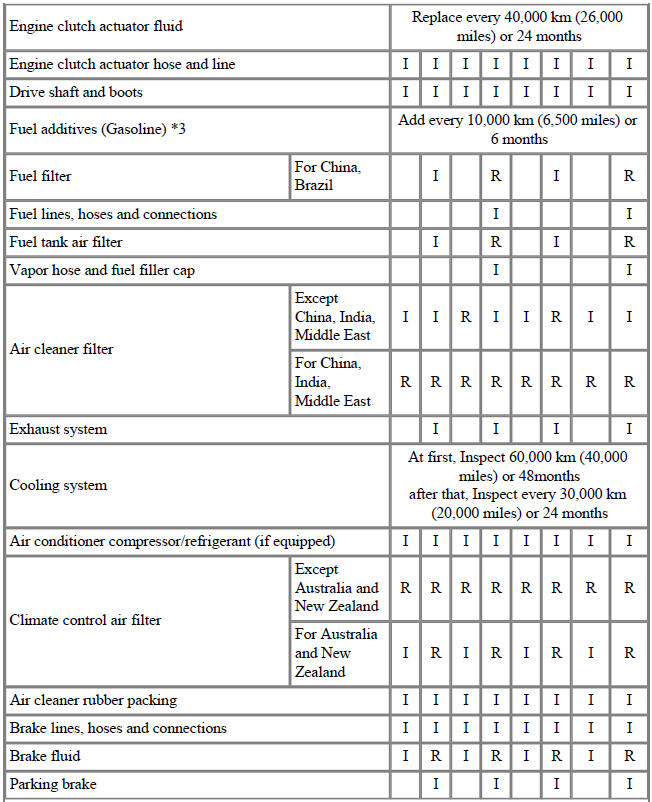

I : Inspect and if necessary, adjust, correct, clean or replace.
R : Replace or change.
Maintenance Under Severe Usage Conditions
- For Gasoline Engine
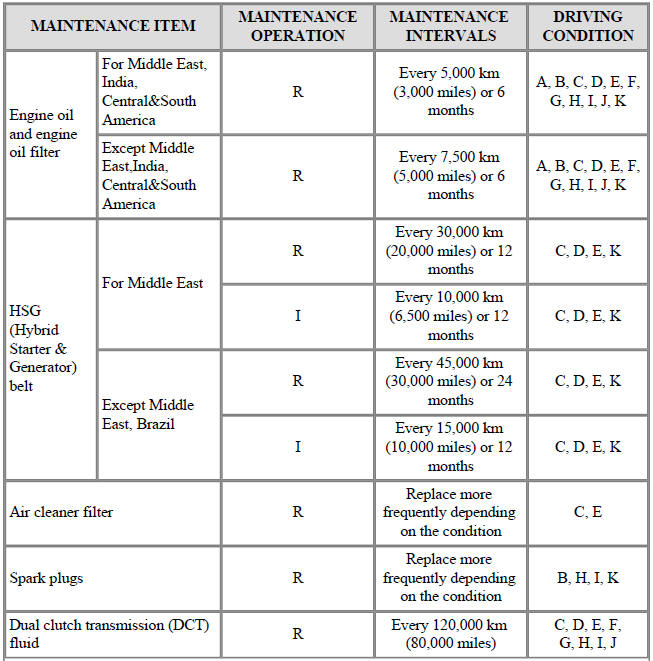
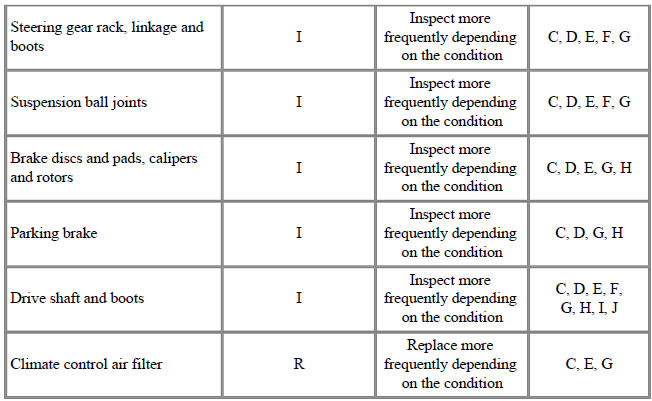
Maintenance operation
I : Inspect and if necessary, adjust, correct, clean or replace.
R : Replace or change.
SEVERE DRIVING CONDITIONS
- Repeatedly driving short distance of less than 8 km (5miles) in normal temperature or less than 16 km (10 miles) in freezing temperature.
- Extensive engine idling or low speed driving for long distances.
- Driving on rough, dusty, muddy, unpaved, graveled or saltspread roads.
- Driving in areas using salt or other corrosive materials or in very cold weather
- Driving in heavy dust condition
- Driving in heavy traffic area
- Driving on uphill, downhill, or mountain road repeatedly.
- Towing a trailer or using a camper on roof rack.
- Driving for patrol car, taxi, commercial car or vehicle towing.
- Driving over 170 km/h (106 mph).
- Frequently driving in stop-and-go conditions.
Maintenance Under Severe Usage Conditions
For Gasoline Engine
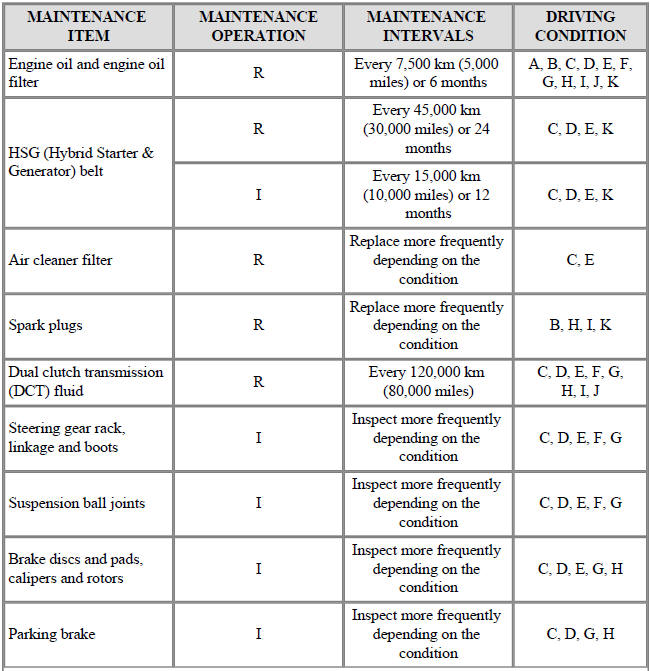

Maintenance operation
I : Inspect and if necessary, adjust, correct, clean or replace.
R : Replace or change.
SEVERE DRIVING CONDITIONS
- Repeatedly driving short distance of less than 8 km (5miles) in normal temperature or less than 16 km (10 miles) in freezing temperature.
- Extensive engine idling or low speed driving for long distances.
- Driving on rough, dusty, muddy, unpaved, graveled or saltspread roads.
- Driving in areas using salt or other corrosive materials or in very cold weather
- Driving in heavy dust condition
- Driving in heavy traffic area
- Driving on uphill, downhill, or mountain road repeatedly.
- Towing a trailer or using a camper on roof rack.
- Driving for patrol car, taxi, commercial car or vehicle towing.
- Driving over 170 km/h (106 mph).
- Frequently driving in stop-and-go conditions.
READ NEXT:
 Basic Inspection Procedure
Basic Inspection Procedure
Measuring Condition of Electronic Parts' Resistance
The measured resistance at high temperature after vehicle running may be high
or low. So all resistance must
be measured at ambient temperature (20ºC, 68ºF), unless stated otherwise.
SEE MORE:
 Remote Operation
Remote Operation
Operating order
Remote Operation operates in the following
order:
Getting ready to remotely move forward
and backward
Remotely moving forward and backward
1. Getting ready to remotely move forward and backward
There are two ways t
 Decreasing set speed
Decreasing set speed
Push the (-) switch down and release
it immediately. The set speed will decrease by 1 km/h (1
mph) each time
the switch is operated in this manner.
Push the (-) switch down and hold it.
The set speed will decrease by 10 km/
h (5 m
Categories
- Home
- KIA Niro EV, Hybrid - Second generation - (SG2) (2021-2024) - Owner's manual
- Kia Niro - First generation - (DE) (2017-2022) - Service and Repair Manual
- Contact Us
